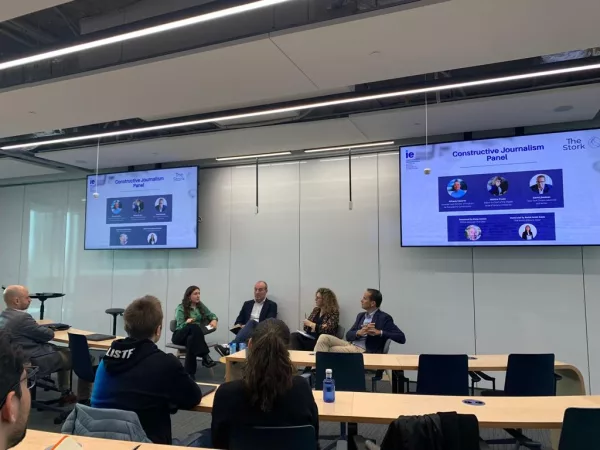On January 25th, the IE School of Global and Public Affairs, in collaboration with the Instituto de Periodismo Constructivo and The Stork, hosted a workshop led by Alfredo Casares, founder, and director of the Instituto, on the topic of constructive journalism. I missed the opportunity to attend, but honestly, I brushed the idea off. As far as I knew, journalism was the most destructive weapon society and governments could wield. After the workshop, however, a competition was announced. The idea was to allow students to put constructive journalism into action and share their opinions on topics affecting their local communities.
I joined The Stork hoping to hone my literacy and interview skills, not to dive into my opinions on the state of the world. However, I decided to give it a chance to prove myself wrong. I sat down quill in hand, ready to blast off against a particular topic in my country: political apprehension. After a long night of research and insight gathering, I felt an eerie discomfort. With every sentence I wrote, I felt more anger and frustration. News has always made me feel like this. One-sided stories with the intent to either cover up the unjustness of the world and provoke havoc or to divert attention and make us obvious to the horrors in it, cultivating naive yet obedient citizens. Years in a populist and media-controlling country like Bolivia turned me bitter and pessimistic, and my writing reflected it. With every stroke, I tried to expose the corrupt system, but in the end, I only managed to tear down my hopes for a better place. One of the pillars of constructive journalism is to respond to the issue, a solution, or a recommendation – but my mind was blank. I decided not to participate. I feared that my tainted view of my country would spread like cancer among other students.
On February 22nd, a continuation of the workshop was held at IE in the form of a panel on constructive journalism. The objective was to discuss constructive journalism applied to international relations, economics, and politics. I was intrigued by the opportunity because I regretted not attending the first workshop. Could this panel change my cynical perspective toward the media? I read a delightful article written by one of my colleagues on the previous event back and forth to have a deep understanding and to prepare myself for the event.

Other writers at The Stork can give a complete and more detailed run-through of the event; I only want to share my insights and thoughts. I want to share with you what changed my mind about journalism and how I intend to share my opinion and news from now on. The purpose of constructive journalism is not to blind the reader to the horrors in our world, but rather to inform the truth while sharing proposals into what can be done based on its four pillars: a response to the issue, insights, evidence, and limitations. One of the guests, David Jimenez from the New York Times, mentioned how he used constructive journalism when there seemed to be no bright side: reporting on earthquakes and tsunami disasters. He recalled going back to the site years after covering the events, talking about the tsunami in Fukushima, Japan, showing how even after such a catastrophic event, people were able to bring the city back to its former state. Focusing not only on the disaster but also on how to help the people seems to be a bright method to use in this situation — just like we share news about disasters, we can share information about how to help, which is what newer generations constantly look for but can’t find in the media. I thought about my social networks without any particular intention other than to retrieve the truth. What do we share when something happens? Do we only focus on the negatives, or do we also spread around possibilities to have a positive impact?
Of course, as journalists, what we say, share, and write has different implications when our jobs depend on it. Media outlets profit from sharing a sense of alarm, and as readers, we share the blame because that is what we inevitably consume. Monica Prado, another of the guests, shared her experience working at Antena 3. She recalled the middle of the COVID pandemic. People would stick to their TVs to inform themselves about the dangers outside. That is true, yet it is not the complete story. She argues that our obsession with news during that time held onto something better: hope. Remember those times? I recall checking the news regularly, hoping for information about the vaccine and restriction changes. Our perception of world events is deeply affected by framing from the media. People at Antena 3 are also aware of this, so they finish one of their segments with a minute of happy news. However, this is not necessarily constructive journalism. Adding up a sparkling story to cover up for all the voids displayed before is not telling the whole story, it is just separating both ends. David mentioned the limitations media outlets have due to the business model. However, he still felt there is room to be more partial and tell greater stories without stirring destructive emotions. He stated, “We need (the media) to regain trust and show the readers that we work for their best interest“. Searching for the truth and not just headlines could restore faith and trust in the industry.
You are probably wondering after reading all this, “so what?”. With all honesty, I asked myself the same question after writing a three-pager about corruption in Bolivia´s judicial system. And that is the right question we should ask ourselves when we write or share something. Am I just spreading chaos, which is undoubtedly necessary, or am I also sharing possibilities? My takeaway from constructive journalism is every time we say something, we must evoke a positive intention. We must try to give a call to action and inform people about the possibilities without blinding them from reality. With every message we share that evokes fear, we must also share something that gives hope.




